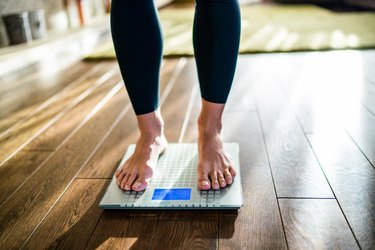
When that time of the month comes around, so can feelings of fatigue, irritability, possible mood swings and an overall sense of blah. You might also notice a higher number on the scale or your clothes feeling tighter than usual.
But, don't worry: Weight gain on your period is normal. Turns out, it's not actually "real" weight, and it usually goes away a few days later.
Video of the Day
Video of the Day
"Weight gain can happen prior to and during the period. Then, within the first couple days of a new cycle, it tends to go away," says Pennsylvania-based ob-gyn, Janine Barsoum, DO.
Here's what's actually happening. Throughout your menstrual cycle, hormone levels fluctuate. The biggest changes happen one to two weeks before your period starts. That's when premenstrual syndrome (PMS) begins, causing food cravings, increased appetite, stress, fatigue, irritability and anxiety. All of these factors can lead to temporary weight gain.
"There are some things you can do to help that, but there's no real way to control it," Dr. Barsoum says.
Weight Gain Before Your Period
In the days leading up to your period, your body is going through major hormonal changes. Two hormones fluctuate during the menstrual cycle— estrogen and progesterone — which affect your sodium levels and cause fluid retention, Dr. Barsoum explains. This is when the bloating and puffiness begin.
"It affects people differently and it is also based on your salt intake and baseline general health," Dr. Barsoum says.
Fluid retention is a result of high estrogen levels that cause your body to hold on to fluid, also known as "water weight". While estrogen levels continue to increase right before your period, progesterone levels take a dip and trigger bleeding.
But that water retention is temporary. Once your period is over and hormones return to their normal levels, it tends to flush out of your system.
If you're looking for relief before the start of a new cycle, you can try, per the Mayo Clinic:
- Limiting salt in your diet
- Taking magnesium supplements
- Taking water pills
These options can help reduce water retention, but won't guarantee it completely goes away.
"In general, you could cut out every ounce of salt in your diet and still have a bit of fluid retention. That's just based on the fact that your hormone levels are increasing in the second half of your cycle," Dr. Barsoum says.
Related Reading
How Much Weight Do You Gain Before Your Period?
"I usually tell patients there's a fluctuation between 3 to 5 pounds," Dr. Barsoum says.
That number will vary depending on the person, the time of day you weigh yourself and the scale. But, there's no need to panic when your body goes through premenstrual changes. Hormonal weight gain is minimal and temporary, not true fat, Dr. Barsoum says.
Tip
The best time of day to weigh yourself is first thing in the morning, according to the Cleveland Clinic. This is after you've emptied your bladder, but before you've taken a bite of breakfast or sip of coffee. That's when you'll get the most accurate results.
Bloating is one major culprit of period-related weight changes, but there are other factors at work, too.
Increased Salt Intake
Those cravings for salty and sweet foods? You can thank the hormone progesterone for that side effect. Increased levels of progesterone lead to strong hunger cravings and the temptation to eat for emotional reasons around one week before your period begins.
"People tend to have these salty cravings, but increasing your salt is going to make that fluid retention worse," Dr. Barsoum says. "One way to combat it is by increasing your protein. Protein helps satisfy your appetite and reduces cravings."
Constipation
Another cause for weight gain is constipation. That's right. On top of bloating, your bowels can get backed up, too.
"There are people who tend to get very constipated around their cycle and that's an effect of progesterone. It's the same hormone that causes constipation during pregnancy," Dr. Barsoum says.
If you're having stomach trouble, there are ways to make you "go". Make sure to eat plenty of complex carbohydrates, fruits, vegetables and leafy greens, according to the Cleveland Clinic. Staying hydrated also helps move waste through your digestive system, so be sure to drink plenty of water, too. If all else fails, you can try medications like laxatives or stool softeners to relieve constipation.
Tip
Talk to your doctor if you notice worsening PMS symptoms, including bloating or weight gain. An underlying condition such as premenstrual dysphoric disorder (PMDD) or polycystic ovarian syndrome (PCOS) may be to blame, according to a June 2017 article in Obstetrics and Gynecology. Your doctor may be able to run diagnostic tests and suggest the best course of treatment.
Lack of Exercise
Finally, period-related weight gain can happen from a decreased level of activity.
"The last thing you want to do is go to the gym or take a walk. So naturally, we see activity levels drop around the time of your period," Dr. Barsoum says.
Though you may not feel up to it, exercise can be helpful for PMS symptoms. Regular exercise was linked with less pain, constipation, anxiety and other symptoms in a November 2019 review in Complementary Therapies in Medicine, which compiled findings from 17 studies on the effects of exercise on PMS symptoms.
Exercise can also reduce bloating and help lift your mood while managing menstrual cycle discomfort.
"We're not talking about running marathons or 90 minutes at the gym. Just a half hour of good, normal exercise to get your body moving," Dr. Barsoum says.
Start With One of These Gentle Workouts
When Does Period Weight Go Away?
After all of those menstrual cycle highs and lows, there's light at the end of the tunnel. Any weight gained before or during your period goes away pretty quickly.
Usually things improve once your period starts, Dr. Barsoum says. Because bloating and water retention are symptoms of premenstrual syndrome, both of those symptoms should taper off when your period begins.
"That's due to the reset of hormones. However, most of the water weight is not resolved until your bleeding actually stops," Dr. Barsoum says.
In the first couple of days after a period you should see the scale settle, and your clothes should go back to fitting properly. "Once those hormonal levels stabilize, that weight is flushed out," Dr. Barsoum says.
- Mayo Clinic: "Water retention: Relieve this premenstrual symptom"
- Cleveland Clinic: "Here’s the Deal with Period Poops"
- Office on Women's Health: "Physical activity and your menstrual cycle"
- Obstetrics and Gynecology Journal: "The Obstetrician–Gynecologist's Role in Detecting, Preventing, and Treating Depression"
- Complementary Therapies in Medicine: "Effect of exercise on premenstrual symptoms: A systematic review"
Was this article helpful?
150 Characters Max
0/150
Thank you for sharing!
Thank you for your feedback!



